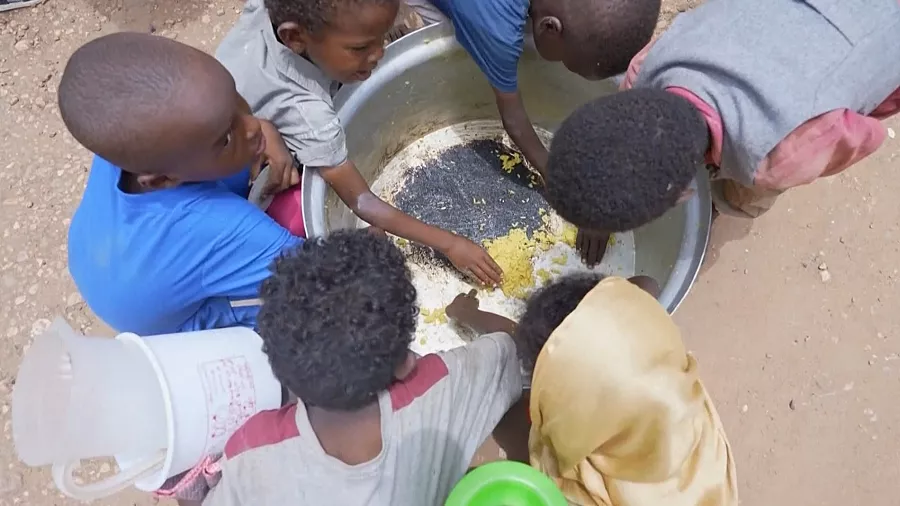Sudan: Food Kitchens Struggle to Sustain Supplies Amid Ongoing Conflict
3 min read
People at a takia in Khartoum, Sudan on Oct 13, 2024.

People at a takia in Khartoum, Sudan on Oct 13, 2024.
In Sudan, a catastrophic humanitarian crisis is unfolding as more than half of the population—approximately 25.6 million people—are facing severe levels of acute hunger or worse, according to United Nations data. As fighting intensifies around the capital, Khartoum, free food kitchens known as Takias are grappling with critical shortages of both funds and supplies.
The conflict, now spanning over a year, pits the Sudanese Army against the paramilitary Rapid Support Forces. This protracted violence has wreaked havoc on agricultural production, one of the country’s vital industries, and has further exacerbated the already dire food security situation.
Khartoum, along with the neighboring cities of North Khartoum and Omdurman, has emerged as a focal point of the fighting, leaving approximately five million residents trapped in a war zone. Many have lost their sources of income, while the prices of food and essential goods have skyrocketed, making survival increasingly challenging.
In addition to the constant threat of airstrikes, shelling, and ground battles, civilians are contending with severe water and power shortages. As a result, food scarcity has become a pressing issue. In a remarkable display of community resilience, some Sudanese citizens have established Takias to offer free meals to families struggling to afford food.
The term “Takia” derives from the Arabic word “mutaka,” which signifies a place where religious rituals are performed, such as Quran memorization. Traditionally, these spaces serve as sanctuaries for the needy, offering both food and refuge.
Currently, over 350 Takias have been set up in and around Khartoum, assisting approximately 500,000 families. These kitchens, often based in residents’ homes, operate on a simple premise: community members line up early for meals, hoping to secure food before mealtime.
“We have established six Takias in the sixth block of Khartoum. Some serve breakfast, while others provide lunch. Each Takia can feed between 220 and 250 families, typically offering rice, millet, or beans,” explained Muhammad Khojali, the head of the Takias in that area.
Historically, these kitchens have relied on funding from UN agencies and donations from Sudanese living abroad. However, since the onset of this year, they have faced severe financial constraints and dwindling supplies. The ongoing conflict has cut off access to the capital and surrounding areas, making humanitarian assistance increasingly difficult to deliver.
As a result, some Takias have been forced to close their doors, while others have drastically reduced their services from offering two meals a day to just one. In some cases, kitchens can only manage to provide a single meal each week.
“The situation is extremely difficult, with a critical shortage of food and water. The Takias are in dire need of more funding, as they have run out of money, just like the people here. We have neither money nor food,” lamented Muhammad Adel, a Khartoum resident.
The persistent conflict has led to a dramatic decline in grain production, disrupting trade and the supply chains for agricultural products. This has culminated in an unprecedented food crisis across the nation. A recent UN report has highlighted that 97 percent of the Sudanese population is facing severe hunger, marking a historic low in the country’s food security.
Experts warn that if the situation does not improve, approximately 2.5 million people in Sudan could perish from hunger by the end of this year. The international community faces a daunting challenge as it seeks to address the urgent needs of a population trapped in conflict, grappling with hunger and the dire consequences of ongoing violence.
As the crisis deepens, the role of community-driven initiatives like the Takias becomes increasingly vital. These kitchens not only provide immediate relief but also symbolize the resilience of the Sudanese people in the face of overwhelming adversity. Without sufficient support and intervention, however, the future remains bleak for millions facing acute hunger and desspair in Sudan.